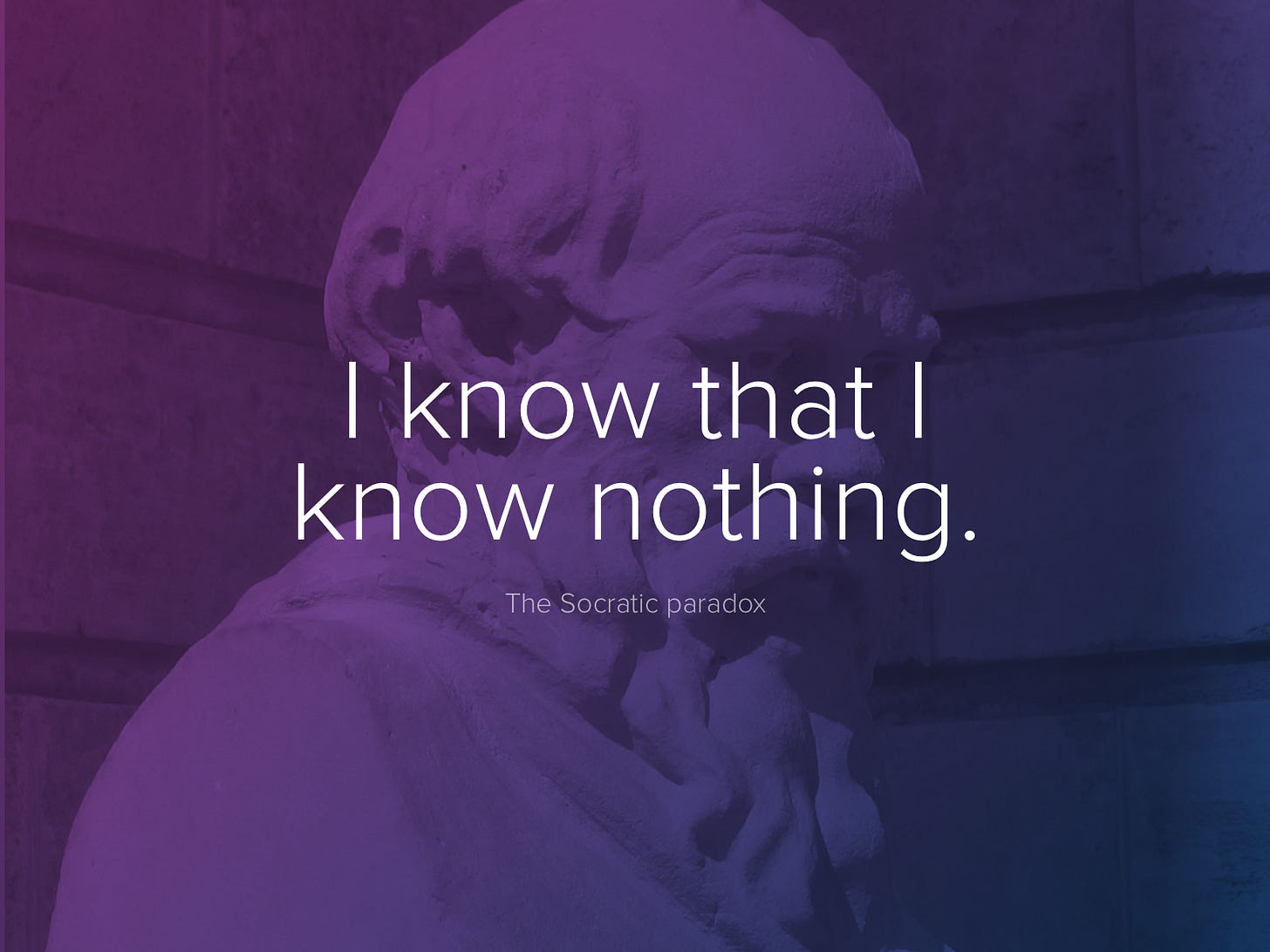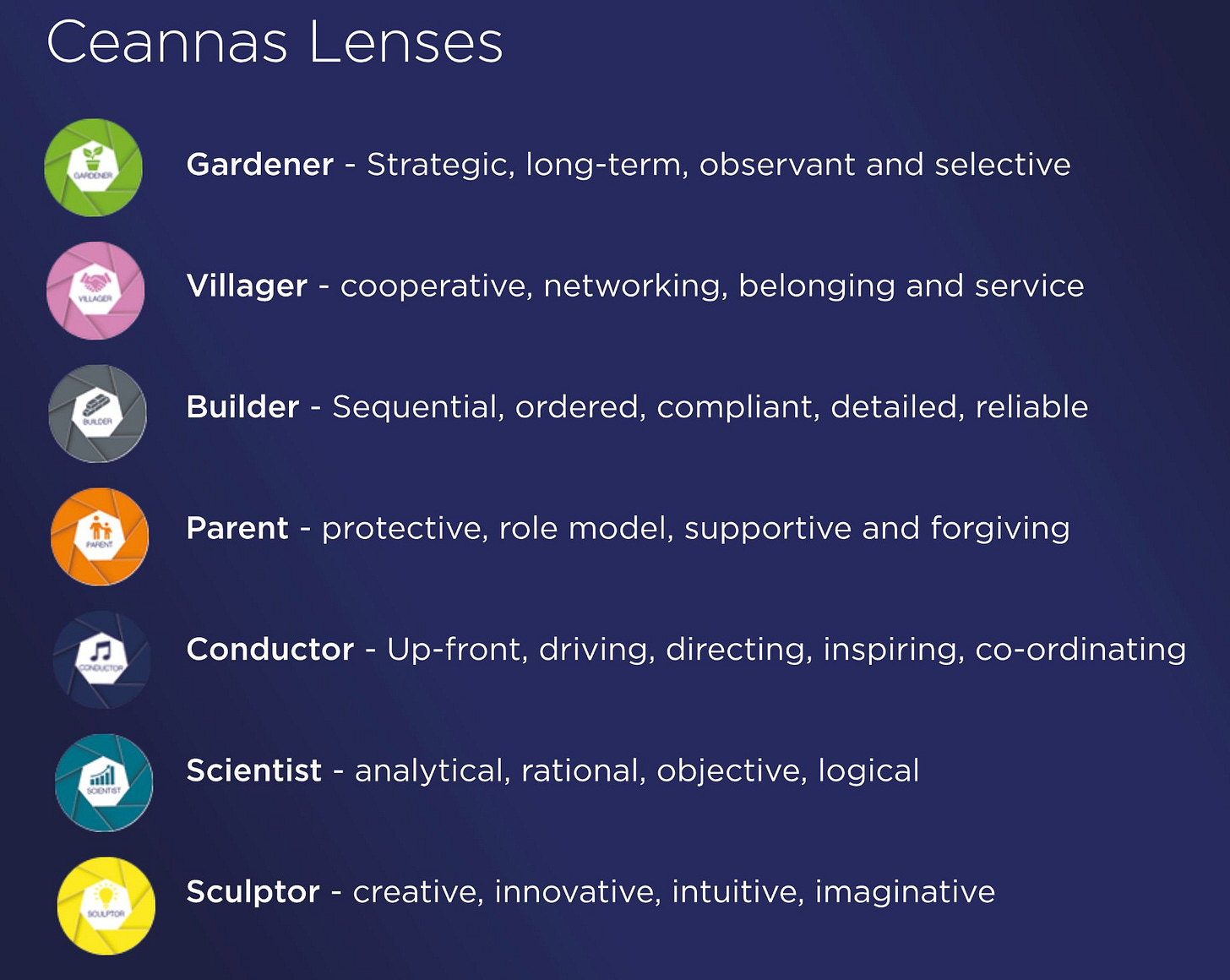"The Wisdom of Knowing that you Know Nothing" - the secret power of truly great leaders
Satya Nadella and The Power of the Socratic Paradox
I happened to catch the final episode of Rory Stewart’s brilliant podcast series on Long History of Ignorance, and thought it was a triumph in terms of exploring our relationship with ignorance and knowledge, but was a bit surprised that he made no mention of the Socratic Paradox.
The Socratic Paradox is famously encapsulated in the statement:
"I know that I know nothing."
This paradox, rooted in the teachings of Socrates, emphasises the importance of recognising one's own ignorance as a starting point for true wisdom and learning. It aligns profoundly with the principles of wise leadership and poses significant challenges for contemporary leaders.
The Socratic Paradox and Its Key Aspects
Key Aspects of the Socratic Paradox
Humility: Acknowledging the limits of one's knowledge.
Openness: Being receptive to new information and perspectives.
Continuous Learning: Engaging in lifelong learning.
Challenges in Embracing the Socratic Paradox
Despite its profound nature, few leaders fully embrace these principles due to several reasons:
Ego and Pride: Reluctance to admit limitations, fearing it could undermine authority or credibility.
Misconceptions of Leadership: Traditional views often equate leadership with having all the answers.
Fear of Vulnerability: Admitting ignorance might expose them to criticism.
Entrenched Cultures: Organisational cultures often discourage vulnerability.
Power and Control: Struggles with giving up power, fearing it diminishes control.
Trapped by our Need to Know
Consider the aspiring and ambitious leader. Their trajectory, aiming for the top of a high-performing organisation, is characterised by an ability to absorb, understand, and apply knowledge in all its intellectual, technical, and practical forms. Distinguished grades, honours, and degrees often recognise this ability.
As these individuals venture into the professional world, they acquire more knowledge, continually setting themselves apart from their peers. Climbing the corporate ladder, they gather vast amounts of knowledge, which, in turn, provides an edge over others competing for senior roles. Eventually, they reach the pinnacle of their career, having proven themselves as the first amongst equals in terms of their 'knowledge' and expertise.
But what if, at that very moment of reaching the top, it was suggested that their continued habit of accumulating knowledge was actually a self-limiting factor in their senior role? How easy would it be for such an individual to suddenly declare to their senior colleagues, "I don't need to know that"?
Such an idea runs contrary to the traditional notion, first promulgated by Francis Bacon in the 16th century:
"Knowledge is power."
For many leaders, this concept still tacitly informs much of their behaviour. Such has been their mastery of their subject on the way up the corporate ladder that the notion of not knowing everything that happens beneath them is a complete anathema.
The Root Cause of Micromanagement
Throughout my career, I've witnessed leaders who undermine their stated intention to empower others within the organisation by exhibiting an overpowering desire to 'know' every detail about their colleagues' responsibilities. This need for control and comprehensive knowledge often leads to micromanagement, resulting in detrimental consequences for the organisation.
Such leaders can operate only in a world of known knowns; they require detailed knowledge of everything happening within the organisation. These individuals often become knowledge gatekeepers. If they don’t understand a concept or process due to its complexity or deviation from the 'known' norm, it is unlikely to gain approval.
The Role of Wise Leaders
In contrast, the wise leader comprehends the limiting impact of attempting to know everything. Ancient Chinese philosophers recognised this folly, as reflected in the wisdom of Lao Tzu:
"To attain knowledge, add things every day. To attain wisdom, remove things every day."
Wise leaders can live with the truth that they cannot know everything. They understand not only the debilitating impact upon themselves but also upon the organisation.
The Socratic Paradox in Action: A Case Story of Satya Nadella
One contemporary leader who embodies the principles behind the Socratic Paradox is Satya Nadella, the CEO of Microsoft. His leadership style reflects humility, continuous learning, and leveraging collective wisdom, all of which are key tenets of the Socratic Paradox.
Socratic Principles and the Ceannas Lenses in Nadella’s Leadership
Sculptor (Creativity and Innovation)
Characteristic: Uncertainty and Innovation
Link to Socratic Paradox: Nadella's willingness to step into areas of uncertainty, such as cloud technology, demonstrates an acknowledgement of what he does not know, fostering a culture of innovation. By embracing uncertainty, he encourages risk-taking and creative thinking within his organisation, leading to groundbreaking advancements in technology.
Builder (Planning and Delivery)
Characteristic: Sequential and Detailed Planning
Link to Socratic Paradox: By recognising Microsoft’s gaps in emerging technology sectors, Nadella admits the company's limitations. This humility allows for meticulous planning and efficient resource allocation. His methodical approach ensures that Microsoft's investments in new areas are well thought out and strategically implemented, turning acknowledged ignorance into actionable strategies.
Scientist (Analytical and Data-Informed)
Characteristic: Analytical and Data-driven
Link to Socratic Paradox: Nadella’s decision-making, heavily backed by data and analytics, reflects the principle of seeking knowledge to fill gaps in understanding. His reliance on data signifies a commitment to evidence-based decision-making, ensuring that Microsoft stays ahead in the competitive tech industry by continually learning from empirical evidence.
Gardener (Strategic and Long-term Thinking)
Characteristic: Deferred and Long-term
Link to Socratic Paradox: Nadella’s focus on long-term strategic growth, through initiatives like cloud computing, embodies the recognition of current limitations and a commitment to continuous improvement. His patience and dedication to long-term goals enable Microsoft to sustain growth and maintain its competitive edge, reflecting the importance of deferred gratification in leadership.
Villager (Community and Relationships)
Characteristic: Service and Relationships
Link to Socratic Paradox: By fostering a collaborative culture within Microsoft, Nadella demonstrates openness to diverse perspectives and collective wisdom. His emphasis on teamwork and inclusivity promotes a sense of belonging and mutual respect among employees, aligning with the Socratic principle of learning from others and valuing their contributions.
Parent (Caring and Supportive)
Characteristic: Belief and Support
Link to Socratic Paradox: Nadella’s empathetic leadership, especially evident during the COVID-19 pandemic, highlights the importance of caring and support. By prioritising employee well-being and showing genuine concern for their needs, he builds a trusting and loyal workforce, rooted in humility and shared human experiences.
Conductor (Inspiring and Ethical Leadership)
Characteristic: Inspiring and Ethical
Link to Socratic Paradox: Nadella’s ability to inspire innovation comes from his willingness to explore new frontiers, encouraging others to embrace their ignorance as a step towards growth. His ethical approach to leadership fosters an environment where creativity and ethical decision-making go hand in hand, driving Microsoft’s success.
The Impact of Embracing the Socratic Paradox in Leadership
Promotion of Curiosity
By embracing the Socratic Paradox, a leader like Satya Nadella promotes curiosity in several ways:
Encourages Questioning: By acknowledging what he doesn’t know, Nadella fosters a culture where questioning the status quo becomes acceptable.
Opens Dialogue: An open mindset encourages voicing ideas and doubts, creating fertile ground for innovation.
Inspires Learning: Nadella models insatiable curiosity, inspiring others to follow suit.
Facilitates Inclusiveness: Encouraging diverse perspectives enhances solutions.
Liberation of Team Members
Embracing the Socratic Paradox also liberates those around him by:
Reducing Pressure: Easing the demand to appear all-knowing allows freedom to explore and experiment, alleviating the fear of making mistakes crucial for innovation.
Empowering Autonomy: Leaders admitting they don’t have all the answers empower their teams to take ownership and initiative.
Fostering Trust: Building a deep sense of trust within the team, knowing that their leader is authentic.
Encouraging Collaboration: Promoting a collaborative environment where everyone feels significant.
Final Thoughts
Understanding and applying the Socratic Paradox allows leaders to tap into the collective wisdom of their teams, creating a culture of continuous improvement and openness.
By adopting the humility and openness of the Socratic Paradox, leaders like Satya Nadella create environments where curiosity thrives, and individuals are liberated, setting the stage for innovation and sustained success. This multi-lens approach encompasses key aspects of wise leadership, ensuring the right decisions are made for the right reasons at the right time.
In the words of Confucius:
"Real knowledge is to know the extent of one’s ignorance."





